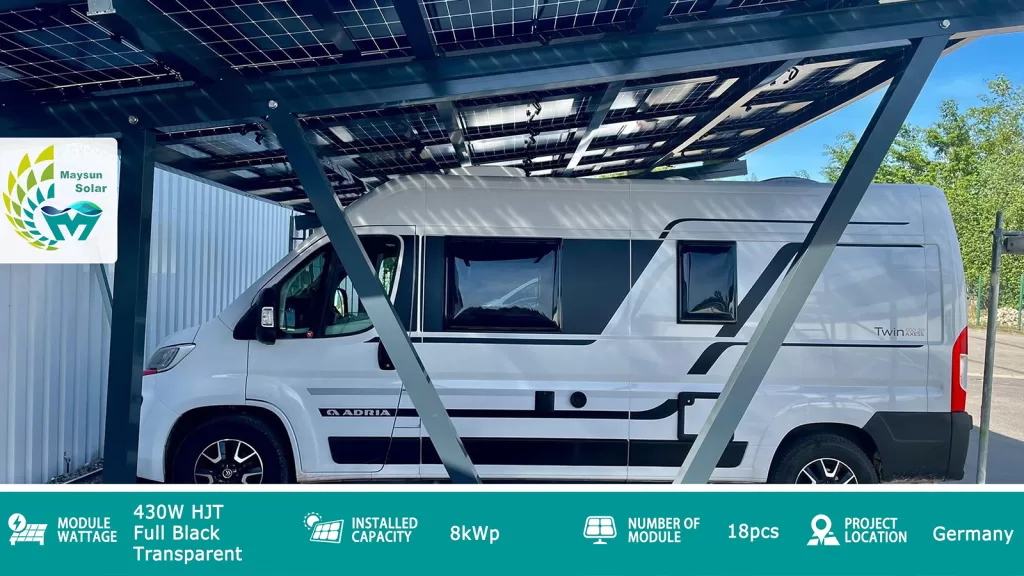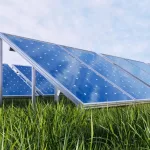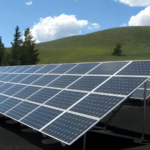Table of Contents
Introduction
The rising adoption of solar technology has paved the way for both innovative and practical applications, one of which is the solar carport. Unlike traditional carports that simply offer shade and protection for vehicles, solar carports integrate solar panels to generate renewable energy. While they share similarities with ground-mounted solar panel systems, solar carports have unique hardware and installation requirements. This guide will provide you with everything you need to know about solar carports, helping you understand why they are a smart and sustainable addition to any property.
What Is A Solar Carport?
Similar to a regular carport, a solar carport, also known as a photovoltaic carport, is a place where you can park your car. While the sides are usually open, the roof is made of solar panels. You can get a solar carport in two ways: Firstly, as a complete package where both the carport and the photovoltaic system come from the same dealer, designed to work together. Alternatively, you can buy them separately, but it’s crucial to ensure that the system fits your carport and can handle its weight, including snow in winter.
Not every house roof is suitable for a photovoltaic system due to space limitations, improper orientation, or excessive shading. Fortunately, solar carports provide homeowners with a viable alternative. They offer flexibility in planning and avoid problematic slopes, making them an ideal choice for home power generation. For optimal results, it’s wise to enlist professionals for PV carport projects. They can customize the system based on your specific needs, such as household electricity consumption and electric vehicle charging requirements. Additionally, they can assist in determining the optimal orientation for your garage to maximize system performance.

Are Solar Carports Waterproof?
Not all solar carports are designed to be waterproof. A waterproof solar carport serves as both a shading structure and an energy generator, shielding your vehicle from rain, snow, and sunlight. Unlike regular solar carports, waterproof ones are designed to prevent water intrusion, which can damage solar panels and reduce their efficiency over time. These carports feature water guides and sealing rubbers to ensure complete waterproofing. Typically constructed from durable materials like hot-dip galvanized steel, 304 stainless steel, or corrosion-resistant aluminum alloys, they offer longevity and resilience against harsh outdoor conditions. To enhance waterproofing, they utilize W-shaped water-collecting and guiding aluminum rails instead of traditional U-shaped ones.

Pros and Cons of Solar Carports
Residential and commercial solar panel carports offer many advantages and disadvantages over rooftop and traditional ground-mounted PV systems.
Pros:
1.Independent Power Supply:
A key advantage of a solar carport is its ability to generate solar energy sustainably and environmentally friendly. This eliminates the reliance on public energy sources. In recent years, electricity prices have been rising by nearly 6% annually. With a solar carport, you can reduce dependency on energy suppliers, whether for charging electric vehicles or household electricity, leading to savings on electricity bills. Given the continuous increase in electricity costs, this is particularly significant.
2.Electric Vehicle Charging:
With a solar carport, you can charge electric vehicles or electric bicycles in your home parking space. Using a wall box or charger, you can directly access power from the photovoltaic system, providing eco-friendly energy for your vehicles. This gives you a self-sufficient electric charging station, with home-generated charging being much cheaper than public charging stations.

3.Self-Funding:
If your carport is efficient enough, it becomes a worthwhile investment. You can quickly recoup the initial costs during use and save a significant amount of money in the long run.
Cons:
1.High Cost:
The support system for rooftop solar projects tends to be relatively low-cost, whereas carports with solar panels require sturdier structures. Typically, the starting price for a carport is at least a few thousand dollars, while prices for large commercial solar carports can reach tens of thousands of dollars.
2.New Construction Preferred:
In many cases, it’s more practical to build a new solar carport rather than retrofitting an existing garage. Retrofitting considerations include sunlight alignment, shading from buildings or trees, roof size, and structural capacity. Due to these factors, retrofitting is often impractical. Wooden structures are especially unsuitable, and removing existing roof coverings can be costly and challenging. Thus, in most cases, it’s more reasonable to demolish the existing garage and construct a new solar carport.
3.Low Protection:
Compared to regular garages, photovoltaic carports are not completely immune to the effects of natural elements or extreme weather. Their open design makes them more susceptible to damage, such as from animals like squirrels, increasing the difficulty of maintenance and protection.
Best Solar Panels for PV Carports
Modern design and partially transparent glass-glass modules are particularly suitable for photovoltaic carports. They boast the highest efficiency, generating the most electricity even in limited available space. These modules not only allow sufficient light transmission but also exhibit high environmental resilience due to their double-sided glass construction. Additionally, equipping high-quality solar cells will further enhance its effectiveness, such as HJT solar panel, which is an excellent choice for PV carports.
In many successful collaboration cases at Maysunsolar, numerous clients have opted for HJT solar panels as their solar carport energy solution. For instance, a recent project involving a client from Germany choosing 430W HJT Full Black Transparent vividly showcased the dual benefits of aesthetics and energy efficiency of the solar carport. This model of solar panels allows sunlight to pass through the gaps and utilizes light refraction to enable bifacial power generation, maximizing the efficiency of light utilization.


Efficiency: 21.2-22.3%
Dimensions (L × W × H): 1760 mm × 1098 mm × 30 mm
Weight: 22 kg
Packaging: 36 pcs/pallet, 936 pcs/40'HQ
Warranty: 30-year product and performance guarantee

Efficiency: 21.2% - 22.3%
Dimensions (L × W × H): 1760 mm × 1098 mm × 30 mm
Weight: 22 kg
Packaging: 36 pcs/pallet, 936 pcs/ 40'HQ
Warranty: 30-year product and performance warranty

Efficiency: 21.74%-22.87%
Dimensions (L × W × H): 2383mm × 1303mm × 35mm
Weight: 38.5 kg
Packaging: 31 pcs/pallet, 558 pcs/40'HQ
Warranty: 30-year product and performance warranty
Frequently Asked Questions About Installing Solar Carports
In addition to the specific information about PV carports, the following matters as well: subsidies, building permits and storage tanks. These matters will help ensure the successful implementation of a PV carport project and maximize its economic benefits.
1.Are There Any Subsidies?
Germany: Homeowners can receive federal tax incentives, reducing the total cost of residential solar carports by 30%. Some states offer additional incentives like rebates and tax exemptions, and there are SREC markets for extra income. The Reconstruction Credit Institute (KfW) provides grants and low-interest loans for solar projects. Municipalities also promote photovoltaic systems. In the future, subsidies will be available for photovoltaic systems up to 20 kilowatts. EEG 2023 regulations offer a feed-in tariff of 7.5 or 8.6 cents per kilowatt-hour.
Italy: To support energy transition, Italy’s Ministry of Environment and Energy has established a €200 million fund for 2024/2025 to provide free photovoltaic systems to low-income families, primarily in southern Italy. However, there are restrictions as follows: Families with Equivalent Economic Situation Indicator (ISEE) below €15,000 or below €30,000 with at least 4 children are eligible. Moreover, the systems must be used for self-consumption, installed on property class A residences, and have a rated power between 2 kW and 6 kW.
France: Homeowners can benefit from various photovoltaic subsidies. The Self-Consumption Bonus provides significant returns based on electricity usage if the system is under 100 kW, installed by an RGE-certified professional, and uses a Linky meter. The Purchase Obligation allows you to sell excess or all electricity to EDF through a 20-year contract, with prices depending on your carport’s power. Additionally, the MaPrimeRénov’ grant covers energy renovations, including solar carports, if installed by an RGE-certified professional.
Want to learn more about photovoltaic subsidies in your country? Leave a comment! We will prioritize writing detailed articles about the most requested countries.
2. Do You Need a Building Permit?
Building a solar carport usually requires approval. However, depending on its size and location, you might not need a building permit in many countries. To understand the specifics, contact your local building authorities in advance. If you plan to install a photovoltaic system on an existing garage, consult them as well.
In some countries, such as Germany, permits are generally required, especially in historic districts. Conversely, in countries like Italy, Spain, and the Netherlands, small carports might not need a permit at all.
Since regulations can change and vary by region, it’s advisable to check with your local building authorities before starting your solar carport project. This will help you avoid unnecessary risks, damages, and additional costs.
3.Is A Battery Storage System Required?

If you plan to buy or operate an electric vehicle, installing a wallbox is essential. While you can theoretically charge an electric car using a standard household socket, it’s not recommended. The charging process is slow and can overload the socket, leading to overheating, damage, or even fire.
Charging your electric vehicle during the day allows you to use the solar power directly. However, for charging at night or on cloudy days, you will need an energy storage system to utilize the power generated by your solar carport. This also applies if you want to use your home’s photovoltaic system power at any time of day. Many suppliers offer solar carports with built-in charging stations as ready-to-use packages.
By combining a wallbox with an energy storage system, homeowners can charge their electric vehicles even when there’s no sunlight.
Conclusion
In summary, a solar carport is a sustainable and innovative energy production solution. When choosing between rooftop solar and a solar carport, it’s essential to consider your specific needs and circumstances. Economically, investing in a solar carport is worthwhile in the long term, as it can pay for itself through energy savings. For electric vehicle owners, a solar carport serves as a home charging station, significantly reducing electricity costs. By adopting solar carports, we can collectively move towards a greener future.
Since 2008, Maysun Solar has been specializing in the production of high quality photovoltaic modules. Our wide range of solar panels such as IBC, HJT, TOPCon soalr panels and Balcony solar power station, utilizes advanced technology for superior performance and guaranteed quality. Maysun Solar has successfully established offices, warehouses and long-term relationships with excellent installers in many countries! For the latest solar panel quotes or any PV-related inquiries, please contact us. We will be happy to serve you, Our products can provide you with a secure guarantee.
Reference:
Brentley, A. (2024, April 10). Solar Carports: What Are The Pros & Cons. GreenLancer. https://www.greenlancer.com/post/solar-carports
Vöpel, A. (2024, January 2). Solar Carport: Vor- und Nachteile + Kosten (2024). Grünes Haus. https://gruenes.haus/solar-photovoltaik-carport/
Solar-Carport mit SOLARWATT Modulen: Günstiger Solarstrom. (n.d.). Photovoltaik-Anbieter Für Module Und Speicher | Solarwatt. https://www.solarwatt.de/ratgeber/solar-carport
SolarCarport: Kosten, Einschränkungen, Baurecht. (2021, November 26). Bauen.de. https://www.bauen.de/a/perfektes-duo-solarcarport-und-elektroauto/
Mösl, A. (2023, September 21). Eine Überdachung mit Solarmodulen: Carports und was sie zu bieten haben. EFAHRER.com. https://efahrer.chip.de/news/carports-mit-solarmodulen-schutz-vor-umwelteinfluessen-und-geldersparnis_106788
Browse. (2022, February 15). The features and benefits of waterproof solar Carport. Mibet Energy. https://www.mbt-energy.com/news/industry/2202151.html
Zhejiang Dongshuo New Energy Co., Ltd. (2023, May 9). Wie könnte ein Solar-Carport wasserdicht sein. Retrieved from https://de.solarmoo.com/info/how-could-solar-carport-be-waterproof-82002979.html
Progettare impianti solari fotovoltaici: Superbonus, Bonus Ristrutturazione, incentivi fiscali 2024. (2024, February 16). Ingenio. https://www.ingenio-web.it/articoli/impianti-fotovoltaici-agevolazioni-fondi-e-bonus-2024-per-incentivare-l-energia-rinnovabile/
EcoFlow. (2024, March 19). Combien coûte un carport solaire et peut-on obtenir des subventions ? Blog FR EcoFlow. https://blog.ecoflow.com/fr/carport-solaire/
You may also like:

Empowering Factories with Solar Energy A Strategic Tool for Controlling Production Electricity Costs
Commercial and industrial solar is becoming a key solution for factories to reduce electricity costs and hedge against price fluctuations. This article systematically analyzes its deployment models, cost advantages, and sustainable value pathways.

How Businesses Can Offset Carbon Taxes with Solar Power
This article analyzes the latest carbon tax policies and photovoltaic deduction strategies, helping European businesses legally reduce taxes, increase profits through solar investment, and achieve a win-win situation for both economy and environment.

Forecast and Response: Seizing the Next Decade’s Growth Dividend in Europe’s Commercial and Industrial Photovoltaics Market
Maysun Solar analyzes the growth trends of commercial and industrial photovoltaics in Europe over the next ten years, from policies and ESG to technological innovation, helping companies seize the initiative in the energy transition.

How to Calculate Solar System ROI and Optimize Long-Term Returns?
Solar power is becoming a key solution for businesses to reduce costs and improve efficiency. Accurately calculating ROI and optimizing long-term returns are essential to maximizing investment value.

Will Agrivoltaics Affect Crop Growth?
Agrivoltaics combines solar energy and agriculture to reduce up to 700 tons of CO₂ per MW, improve water use, and boost crop growth for sustainable farming.

6.5 Billion Loss Hits Photovoltaics: Reshaping or Elimination?
In 2025, the photovoltaic market may see a turnaround as some companies take early action. A €6.5 billion loss is driving businesses to explore new growth areas like energy storage and hydrogen. Which giants will break through? Industry transformation is accelerating!



